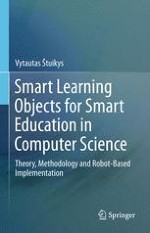2015 | OriginalPaper | Buchkapitel
13. Smart Education in CS: A Case Study
verfasst von : Vytautas Štuikys
Erschienen in: Smart Learning Objects for Smart Education in Computer Science
Aktivieren Sie unsere intelligente Suche, um passende Fachinhalte oder Patente zu finden.
Wählen Sie Textabschnitte aus um mit Künstlicher Intelligenz passenden Patente zu finden. powered by
Markieren Sie Textabschnitte, um KI-gestützt weitere passende Inhalte zu finden. powered by
